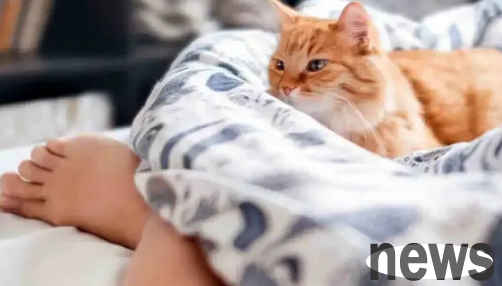Cats bite their hands and feet, which are mostly for sexual attacks
Cats need hunting games every day. The game content includes: tracking, chasing, attacking, ambushing, jumping, hitting, slapping, scratching, fighting, and biting.
Moving things often trigger the cat's instinct to plunder and hunt.
The shoveler's shaking hands and feet may just become TA's "hunting target", thus launching an attack on him.

The feet hidden under the quilt can further stimulate the cat's desire to hunt
Under the cover of the quilt, the feet are more like "prey moving under cover";
In addition, the feet are not flexible in their hands and move slower, and the movement route is relatively single and easy to predict, so it is easier for cats to choose as prey targets that they bite.

But in the middle of the night, I will snatch you up and play
However, cats will grab or bite your feet in the middle of the night, not to call you up and play in the middle of the night.
Their original intention is that they just wake up and it’s time to hunt (it can also be understood as wanting to play). After selecting a prey target, they start to exercise their hunting ability...
Your feet = prey, just like the little mice in the field and the birds on the trees.
The feet hidden under the quilt in the eyes of the cat = prey hidden under the grass
This neither intends to obtain your cooperation nor requires your response or accompanying you.
But if you wake up and respond, the nature will change...
The cat will mistakenly think that at this time, if you scratch the person's feet, she/he will turn on the light, get up, feed me delicious food, play with me, and get all kinds of benefits.
From then on, I develop the "good habit" of eating your feet in the middle of the night, asking for food and playing with you.
When you get up, you usually have this behavior, and the aggressive behavior that is used to simulate hunting will disappear after the cat is 2 years old. This kind of aggressive behavior is generally seen in kittens and cats under 2 years old.
If your cat is less than 2 years old, weaken bad habits:
Behavioral consultant Mieshelle Nagelschneider believes that inappropriate play patterns as children will enhance this behavior.
So, don't tease the cat with your hands and feet! Don’t hide your hands and feet under the quilt and play this "hide and seek" game!

If your cat is >2 years old, you should guide good habits:
The American Association of Feline Doctors has clearly stated that providing cat stick guidance can effectively transfer the behavior of cats pounding the cat's feet; providing soft and elastic biting toys will make your feet "not so attractive anymore".

While gradually diverting the cat's attention and cultivating the habit of slapping, you must learn to "bear the pain and pretend to die when you are bitten" and "the cat will give you a reward if you bite the toy."